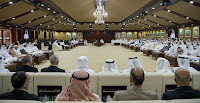It was a bright January day at the Al Bateen Palace, and students, princes and bureaucrats gathered in the crown prince's majilis to hear U.N. climate chief Christiana Figueres explain what the Paris climate deal means for the United Arab Emirates.
...
The Costa Rican woman addressing the assembly spoke with the tact of a practiced diplomat, but her message was clear: The UAE should spend its oil wealth to prepare for a future where the product that brought it out of poverty no longer plays a dominant role.
While that advice would have met with intense resistance from energy producers elsewhere -- the American coal fields, for instance -- Figueres spoke with confidence that it would be well-received. That's because UAE founder Sheikh Zayed bin Sultan Al Nahyan made conservation of the region's oil and gas resources a founding principle.
"He really breathed that," Figueres said. "He was saying that 40 or 50 years ago, before anyone else was."
The Abu Dhabi ruler displaced his brother in a bloodless palace coup in part because he was the more aggressive booster of oil and gas development as a way to bring the country into the modern world. Abu Dhabi in 1952 was the poorest of what were then known as the trucial states, its few thousand residents subsisting on pearls, fish and other resources dredged from the nearby Persian Gulf. The 1958 discovery of oil off its coastline put the nation on track to what it would become: a hypermodern 2.7-million-resident capital, its traditional palm frond houses swapped for Western-style residences and swanky hotels.
But Zayed also warned his countrymen not to put all of their eggs in the fossil fuels basket.
"We have to diversify the sources of our revenue and construct economic projects that will ensure a free, stable and dignified life for the people," he said in the 1970s.
It's a view the nation's current leaders seem to still hold -- though it is oil demand rather than supply that is seen as finite in a world where nations produce diverse energy resources and fewer, under the Paris deal, may want it.
Putting a premium on diversification
The UAE, more than any other country in the region, has turned to renewable energy as a way to cut domestic use of its petroleum products, maximizing their export potential.
The country has one of the more ambitious targets in the region: It aims to have 24 percent of all energy coming from low-carbon sources by 2021, and its leaders call the pledge conservative. Some of that power will come from the UAE's fledgling nuclear program -- four reactors are expected to come online by 2020 at the Barakah nuclear power plant. The emirates of Abu Dhabi and Dubai also have separate renewable energy standards of 7 percent and 5 percent, respectively, by 2020.
The country announced last year that it will invest $35 billion in clean energy by 2021.
Meanwhile, its leaders talk openly about an end to oil.
Read more at Oil-Rich UAE Aims to Stay an Energy Leader in Post-Paris World

No comments:
Post a Comment